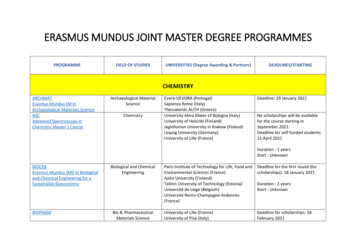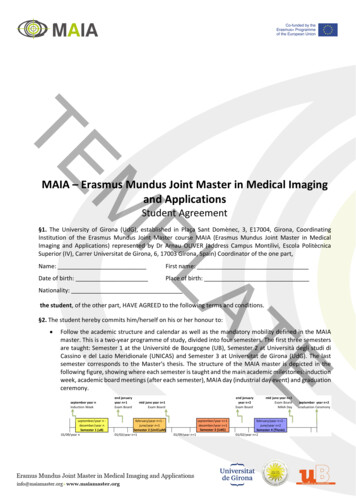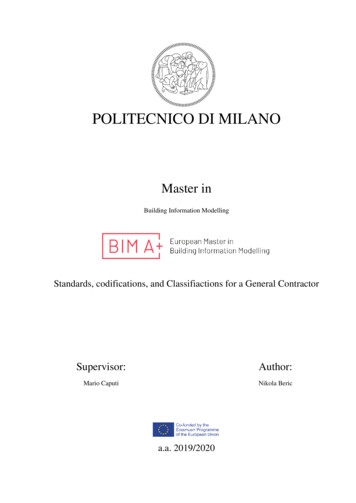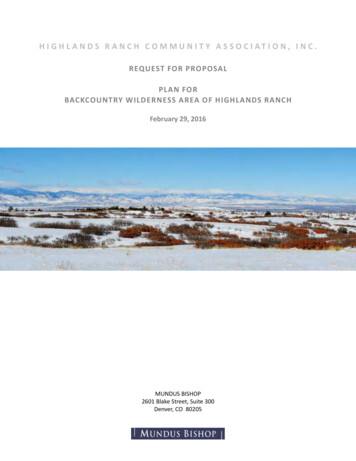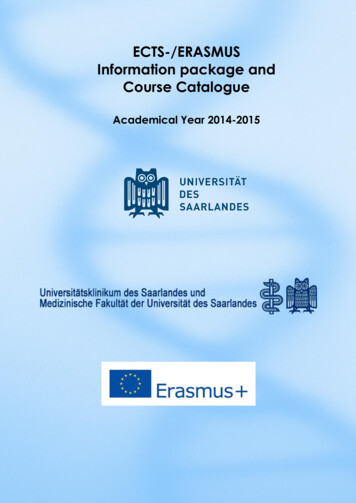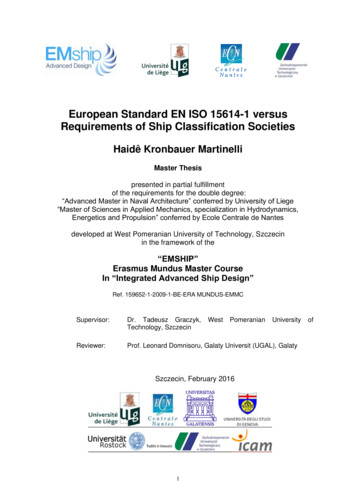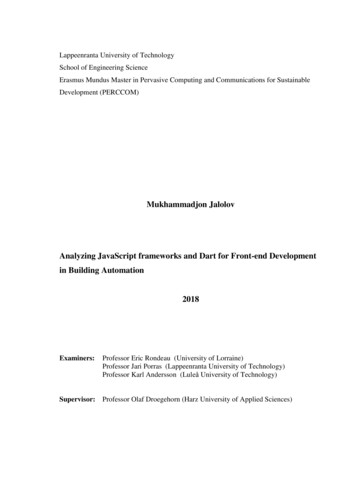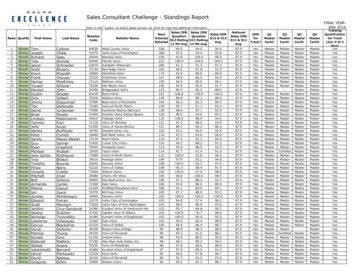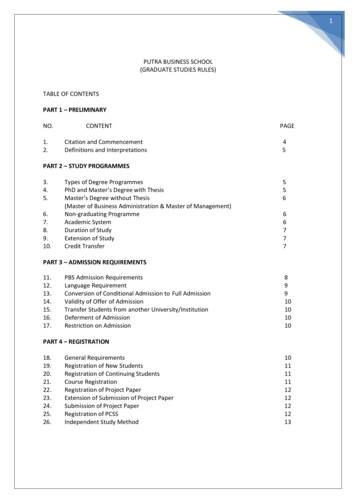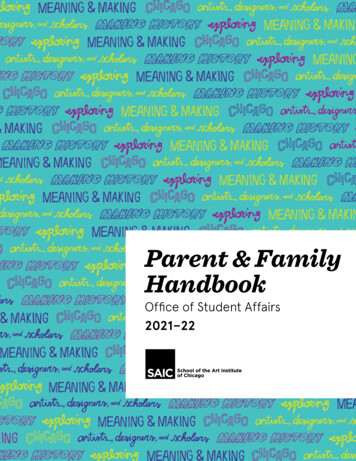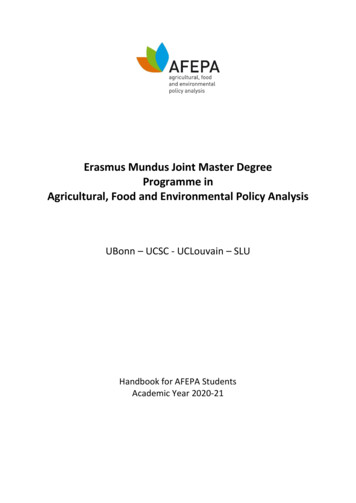
Transcription
Erasmus Mundus Joint Master DegreeProgramme inAgricultural, Food and Environmental Policy AnalysisUBonn – UCSC - UCLouvain – SLUHandbook for AFEPA StudentsAcademic Year 2020-21
Table of Contents1. Introduction . 12. Information on the AFEPA Master’s Programme. 22.1 Contact information . 22.2 Programme Description . 22.3 Programme Objectives . 42.4 Requirements, Application and Admission . 52.4.1 Admission Criteria . 52.4.2 Application Timetable . 62.4.3 Application Procedure . 62.4.4 Appeal procedure . 92.4.5 Student Agreement . 92.5 Programme Structure and Course List . 92.6 Academic Calendar . 132.7 Summer School. 132.8 Master’s Thesis . 132.9 Degree Awards . 142.10 Fees and Scholarships . 152.10.1 Fees. 152.10.2 Student Scholarships . 172.11 Erasmus Mundus Alumni Club . 182.12 Useful Links. 182.13 Social Media and Intranet . 193. Information on the Rheinische-Friedrich-Wilhelms Universität Bonn, Germany . 203.1 Contact Information . 203.2 General Information on Germany . 203.2.1 Travel to and in Germany . 203.3 Specific Information about Bonn . 223.3.1 How to Get Around . 233.3.2 Obtaining a Resident Permit . 253.3.3 Health insurance . 273.3.4 Opening a Bank Account . 283.3.5 Other Practical Matters . 293.4 Bonn University . 303.5 The Department of Economic and Agricultural Policy . 313.6 Student Life . 313.6.1 Accommodation . 353.6.2 Sports. 364. Information on the Università Cattolica del Sacro Cuore, Italy . 37AFEPA Handbookwww.afepa.eui/75
4.1 Contact information . 374.2 General Information on Italy . 374.2.1 Travel to and in Italy . 374.3 Specific Information about Milano and Cremona . 384.3.1 How to Get Around . 384.3.2 Obtaining a Resident Permit . 404.3.3 Opening a Bank Account . 414.3.4 Other Practical Matters . 414.4 Università Cattolica del Sacro Cuore . 424.5 The Graduate School in Agricultural and Food Economics . 434.6 Student Life . 434.6.1 Accommodation . 465. Information on the Université catholique de Louvain, Louvain-la-Neuve, Belgium. 485.1 Contact information . 485.2 General Information on Belgium. 485.2.1 Travel to and in Belgium. 485.3 Specific Information about Louvain-la-Neuve . 505.3.1 How to get around . 505.3.2 Obtaining a Resident Permit . 515.3.3 Opening a Bank Account . 525.3.4 Other Practical Matters . 525.4 Université catholique de Louvain . 535.5 The Agricultural and Natural Resource Economics . 545.6 Student Life . 555.6.1 Accommodation . 555.6.2 Cultural Activities . 555.6.3 Sports. 566. Information on the Swedish University of Agricultural Sciences, Uppsala, Sweden . 576.1 Contact Information . 576.2 General Information on Sweden . 576.2.1 Travel to and in Uppsala and Sweden . 586.3 Specific Information about Uppsala . 606.3.1 Obtaining a Residence Permit . 616.3.2 Opening a Bank account. 626.3.3 Cost of Living . 626.3.4 Other Practical Matters . 636.4 Swedish University of Agricultural Sciences. 656.4.1 The Faculty of Natural Resources and Agricultural Sciences . 686.4.2 Ultuna Campus . 686.5 The Department of Economics . 696.6 Student Life . 696.6.1 The role of the Student Unions . 706.6.2 Accommodation . 71AFEPA Handbookwww.afepa.euii/75
1. IntroductionThis handbook sums up the programme details of the AFEPA Master’s programme and is accessibleon the website of the programme (www.afepa.eu). This handbook aims at informing currentstudents as well as those interested in the AFEPA Master’s programme for future editions about thecontent of the AFEPA Master’s programme and about its partner universities and organisations.We particularly welcome any feedback from AFEPA students in terms of content so that we canimprove future versions of this handbook.AFEPA Handbookwww.afepa.eu1/75
2. Information on the AFEPA Master’s Programme2.1 Contact informationFor the AFEPA coordination office at the University of Bonn, please contact: info@afepa.euTable 1: Contact persons at the main and associated academic partnersUniversityCoordinator RheinischeFriedrich-WilhelmsUniversität Bonn,GermanyMainUniversità CattolicaAcademicdel Sacro Cuore,PartnersItalySwedish Universityof AgriculturalSciences, Uppsala,SwedenUniversitécatholique deLouvain, Louvain-laNeuve, BelgiumAssociatedAcademicPartnersNameProf. ThomasHeckelei,Dr. ManuelaMeranerProf. Paolo SckokaiContact 49 (0)228 73-3036afeco@ilr.uni-bonn.deProf. Yves Surry,Emma Arias Olsson018 - 67 17 86emma.arias.olsson@slu.seProf. Bruno Henryde Frahan (retired asof Sept.2019)Prof. FrédéricGaspartProf. José M. Gil 32 10 47 36 73bruno.henrydefrahan@uclouvain.be 32 10 47 36 nica deCatalunya, SpainPontificiaProf. GustavoUniversidad Catolica Anriquezde Chile, ChileAfrican EconomicInnocent MatsheResearchConsortium 39-0523-599290paolo.sckokai@unicatt.it lInnocent.Matshe@aercafrica.org2.2 Programme DescriptionThe Master’s programme in Agricultural, Food and Environmental Policy Analysis (AFEPA) aims atproviding a high-quality education in designing and assessing public policies targeted to theagricultural and food sector as well as the rural environment to excellent students from all over theworld. It therefore responds to the increasing need to better understand and anticipate the variousand often complex socio-economic and environmental effects of these policies either in afunctioning market economy as in the European Union or in economies in a development ortransition phase world-wide.AFEPA Handbookwww.afepa.eu2/75
The programme is policy oriented, focused on economic analysis, but with a strong multidisciplinarycomponent. By the setting of criteria of admission and by courses in advanced microeconomictheory and quantitative methods the programme provides the basis for applied policy analysisfounded on state-of-the-art economic models and econometric tools. Drawing on complementary,specialized teaching and research expertise of professors from several universities, the Master’sprogramme offers teaching relevant for the analysis of agriculture, food and environmental policyissues within a unified framework exposing students to policy traditions in different Europeancountries.The AFEPA Master’s programme offers a two-year academic curriculum with integrated andadvanced theoretical, methodological and empirical courses in economics and quantitative methodsas well as in the five subject areas proposed below. To connect theory and methodology to practice,a problem-solving project is developed and presented as a Master’s thesis at the end of the twoyear curriculum.The AFEPA programme is jointly organized by four European main partner universities and threeassociated partners. The AFEPA partner universities are recognized worldwide for the quality of theireducational programme and scientific achievements in agricultural, environmental and economicsciences.The AFEPA main partner universities are: Università Cattolica del Sacro Cuore (UCSC) in Milano, ItalyRheinische Friedrich-Wilhelms-Universität (UBonn) in Bonn, GermanySwedish University of Agricultural Sciences (SLU) in Uppsala, SwedenUniversité catholique de Louvain (UCL) in Louvain-la-neuve, BelgiumThe associated AFEPA partner universities are: Pontificia Universidad Católica (PUC) in Santiago, ChileUniversitat Politecnica de Catalunya (UPC) in Barcelona, SpainAfrican Economic Research Consortium (AERC) in Nairobi, KenyaStructureThe 120 ECTS credits required to obtain the Master’s degree of the AFEPA programme arestructured into three blocks: a minimum of two semesters of studies (60 ECTS credits) at a first main partner university two semesters of studies (54 ECTS credits) at a second main partner university (includingMaster thesis) two joint summer schools (6 ECTS) at partner universitiesSome of the ECTS credits can also be earned from an associated partner university during thesecond academic year of the programme.Major / MinorBesides the mandatory courses of min. 30 ECTS credits in theory and methods, optional coursescan be selected to form a major of 30 ECTS credits or a minor of 15 ECTS credits in the followingthematic fields: Agri-food and trade policyAFEPA Handbookwww.afepa.eu3/75
Environmental and natural resource policy Agribusiness and market analysis Market and consumer research Development policyAn internship at an associated non-academic partner organization during the second year of studycan also be taken for a 6 to 15 ECTS credits depending on the main partner university.LanguageThe language of instruction is: English for: all the courses at SLU, UBonn and UCSC, most of the courses at UCLouvain andUPC French for: some of the courses at UCLouvain Spanish for: most of the courses at PUCExamination can be organized in English at all partners.Because a sufficient number of courses at UCLouvain and UPC are taught in English, knowledge ofeither French or Spanish is not necessary. Because most of the courses at PUC are taught in Spanish,knowledge of Spanish is therefore necessary. Students speaking either French or Spanish,respectively, at the three universities not only have a wider selection of courses to choose from, butcan also facilitate everyday life.2.3 Programme ObjectivesStudying at two of the four main partner universities, students from Europe and from the rest of theworld have the opportunity to establish a rich professional and academic network involving fellowstudents and teachers associated with the programme. In this and other ways the programmeassists students to obtain access to universities in Europe and beyond in the pursuit of furtheracademic qualifications to undertake agricultural, food and environmental policy analysis. Studentshave also the possibility to spend a short study or research period at the three associated partneruniversities and may be able to integrate their academic credits earned into their academiccurriculum at one of the two main partner universities. A professional exposure can be obtainedwith an internship at an associated non-academic partner organization during the second year ofthe Master’s programme.Academically the programme distinguishes itself from existing programmes in Europe by: being policy oriented, being based on state-of-the art training in microeconomics and micro-econometrics, combining the analysis of agricultural, food and environmental policy issues within unifiedeconomic framework, however also exposing students to multidisciplinary approaches.Learning outcomesThe Master’s programme in Agricultural, Food and Environmental Policy Analysis trains graduatestudents that will be:AFEPA Handbookwww.afepa.eu4/75
1. aware of the economic, social and environmental dimensions of the performance andcompetitiveness of the agricultural and food sectors and other profit (market) and non-profit(non-market) activities in rural areas,2. able to understand the fundamentals of recent economic theory as well as its strengths andweaknesses,3. able to use and apply adequate methods and tools to address and analyze socio-economicand environmental problems that are observed or anticipated in the agricultural and foodsectors and rural areas in different development contexts,4. able to use complementary approaches from other disciplines when needed,5. able to perform sound quantitative economic analysis and anticipate possible effects ofpolicy and regulation reforms,6. able to interpret results and derive policy implications and recommendations,7. able to draw from European experience and expertise in designing and evaluating policy andregulatory reforms given the economic, social, environmental and ethical dimensions of theissues societies are facing, expressing structural change,8. able to communicate their methods and results to both specialized and non-specializedaudiences, hopefully in at least two European languages.The main objective of the AFEPA Master’s programme is that recipients be qualified to use and applyadequate methods to analyze socio-economic problems, formulate policy recommendations andunderstand the risks and consequences of any given economic policy measures, especially thoseoriented towards the agricultural and food sector, rural areas as well as natural resources and theirenvironment. In particular, recipients are expected to be able to use and develop quantitativemethods to perform rigorous socio-economic and environmental assessment of these publicpolicies, and provide sound and relevant policy recommendations to a better sustainabledevelopment of rural areas.Career opportunitiesRecipients are qualified to take responsibilities in international, national and regional agencies, nongovernmental organizations, consultancy firms, professional organizations and private companiessuch as banks, insurances and agricultural, environmental and food business. Because of theresearch orientation of the AFEPA Master’s curriculum, they are also well prepared for doctoralstudies.2.4 Requirements, Application and Admission2.4.1 Admission CriteriaThe AFEPA Master’s programme is open to European and non-European excellent students.Candidates must agree to complete the academic curriculum in two consecutive academic years andaccording to the terms as specified in the student agreement.AFEPA Handbookwww.afepa.eu5/75
To be admitted to the ERASMUS Mundus Master’s Programme in Agricultural, Food andEnvironmental Policy Analysis candidates need to have: A Bachelor’s degree or an equivalent academic degree of minimum three years ofundergraduate study corresponding to 180 ECTS credits with a grade of at least an overallaverage “B” or equivalent. Students in their final year of their Bachelor’s degree may beprovisionally admitted in the AFEPA Master’s programme on the condition that theirBachelor’s degree is awarded prior to enrolment in the programme.A minimum of 24 (ECTS credits) in economics gained in the Bachelor’s degree – includingone course in microeconomics, management and statistics. An additional introduction toagricultural, environmental or food sciences is recommended. Please make sure that yourofficial bachelor’s transcript either shows credit points according to the ECTS credit pointsystem or else attach a diploma supplement that explains the credit point system of youruniversity.Letter of Motivation (no more than 300 words)Reference Letters:Applicants will be asked to provide two referees in their application form and those tworeferences will then be contacted in order to upload a reference letter for an applicantdirectly onto the platform. Applicants must therefore make their potential referees awareabout the fact that they will be contacted directly by the AFEPA application platform.English proficiency test results (not older than two years): Test of English as a Foreign Language (TOEFL): 90 on the Internet-based Test (IBT),with a minimum of 20 on the written part. International English Language Testing System (IELTS): an overall band IELTS score ofat least 6.5, and no section below 5.5. A test deemed equivalent by the AFEPA Management Board (if you want to submittest results other than from the TOEFL or IELTS tests please obtain our confirmationof that particular test prior to sending your application package). Note: Applicants from English speaking countries must provide an official letter fromtheir university from which they graduated attesting that English is the media ofinstruction. It is upon the consortium’s decision whether an English Test as describedabove must be submitted additionally.2.4.2 Application TimetableApplication deadlines for programme admission (AND Erasmus Mundus scholarship) for thefollowing academic school year: January 31, 2021: for all applicants.2.4.3 Application ProcedureSTEP 1: Register at the AFEPA application platform www.applications.afepa.eu. You willautomatically receive a confirmation email, providing you with your log-in information: user ID andpassword. Before starting the application procedure, make sure you:AFEPA Handbookwww.afepa.eu6/75
have read the admission requirements carefully. The AFEPA consortium will apply the criteriavery meticulously. If you have any questions please contact the AFEPA coordination office atinfo@afepa.eu. are familiar with the application deadlines before starting your application. Please note thatdifferent deadlines exist for scholarship and non-scholarship applicants. For the latter groupthe deadlines also vary based on the geographic origin.STEP 2: Complete your application in the application platform before the deadline. Make sure youdevote enough time for this step to gather and prepare all the necessary documents.At this point no paper version of any documents need to be submitted. All documents thatapplicants upload onto the platform, however, will have to be either a copy of an original (if theoriginal document is written in English) or certified translated copy of the original (if the originaldocument is written in language different than English). The AFEPA consortium may ask applicantsat a later date to send paper versions of their application documents. For each required document(ex. Bachelor Diploma and Transcript of Records): please merge all original copies and translationsinto one pdf document in order to upload them.We strongly advise you to start this process well in advance of the application window, particularlyin regards to the English language proficiency* requirement and the reference forms**. You cansave your progress and come back to the online application platform as often as you like.Required documents include: Photo Copy of identification (e.g. ID, Passport). Copy of academic transcripts and diploma (translated certified copy if original is not inEnglish) Copy of school-leaving certificate (high school certificate) (translated certified copy iforiginal is not in English) Copy of other relevant documents Copy of language certificate (see requirements) Motivation letter (no more than 300 words) 2 Reference forms (Please list your referees with their names and email addresses in theonline application platform. Preferably, one referee should be academic. An automatic emailwill be sent to the referees you have chosen, asking them to submit their filled referenceform directly to us (please note that your referees will fill in a customized format of thereference form). You will be able to see whether they have submitted their references byverifying the checklist of your application form.)****Applicants having their original documents written in language different than English must submita certified legal copy of their original documents in English.AFEPA Handbookwww.afepa.eu7/75
** AFEPA is an English language master’s programme. In the case where either the official diplomaor official marks list is in another language, two versions of the document must be submitted: theoriginal and a certified translation into English (all merged and submitted as one pdf document).*** The referees will need to fill in, sign and upload their reference forms before the applicationdeadline. Please note that in order to submit your application, your reference forms must beuploaded to the platform.Candidates applying to the AFEPA master’s programme within the regular deadline 31st of Januarycan simultaneously apply for an Erasmus Mundus Joint Masters Degrees (EMJMD) ScholarshipsSTEP 3: Wait. All applications will be reviewed and ranked by the academic board.Ranking of ApplicantsApplicants are ranked according to their academic merit and the other AFEPA minimumrequirements. The admission of applicants is based on decisions made by the Consortium Board.The Consortium Board will allocate the students among the four universities for the first semesterbased on students’ preferences and their rank in the application process.The coordinator will conduct an initial filtering (based on minimum requirements) and submit theremaining applications for consideration by the Consortium committee. A preselection of the beststudents among the completed submissions is then made by the Consortium committee. Thepreselection of these students will depend on the excellence of their studies. At the end a rankingmeeting will be organised by the Consortium committee to discuss the top candidates and to selectthe final scholarship recipients. A final list of students (main list and reserve list) will be establishedin accordance with the admission requirements.Regional, gender and social situation will be taken into account in the final selection (i.e. among thebest candidates) but will not take precedence over merit, quality and competence. The process willrespect the principles of Euraxess “European Charter for Researchers” and the “Code of Conduct forthe Recruitment of Researchers” including non-discrimination, equal treatment, transparency,recognition of qualifications, lifelong development and mobility experience. The final selection ofcandidates will comply with the maximum number of scholarships per country and per institutionof origin defined by the European Commission.Application ResultThe result of the admission process and EMJMD student scholarship for all applicants (fromprogramme and partner countries) is send out in March to each applicant via email. The followingoutcomes are possible: accepted with scholarship, accepted with scholarship – waiting list, acceptedwithout scholarship, not accepted. Scholarship applicants should be notified of their status at thebeginning of March; for the self-funding applicants this depends on the time when they submittedtheir application, and on the 1st year chosen university and it’s deadlines for programme admission.AFEPA Handbookwww.afepa.eu8/75
2.4.4 Appeal procedure AFEPA applicants have the right to appeal against the selection decision. For doing so,applicants should fill in an appeal form and send it to the AFEPA coordination office(info@afepa.eu) together with supporting documents (if necessary), within a period of 15days starting from the day after the notification of selection results. The AFEPA ManagementBoard will respond within one month after reception of the appeal. Before appealing, please note that our selection process is very competitive. Fewscholarships are available in relation to the large number of high-quality applications.2.4.5 Student AgreementA Student Agreement between the AFEPA coordinator and the student enrolled in the AFEPAMaster’s programme explicitly indicates any academic, financial and administrative modalitiesrelated to the student's participation in the Master’s programme and, if applicable, the award andusage of a scholarship. Mutual rights, obligations and responsibilities indicated in such StudentAgreement is in accordance with those enforced in the partner institutions.2.5 Programme Structure and Course ListThe Master’s programme in Agricultural, Food and Environmental Policy Anal
The Masters programme in Agricultural, Food and Environmental Policy Analysis (AFEPA) aims at providing a high-quality education in designing and assessing public policies targeted to the agricultural and food sector as well as the rural environment to excellent students from all over the world.
